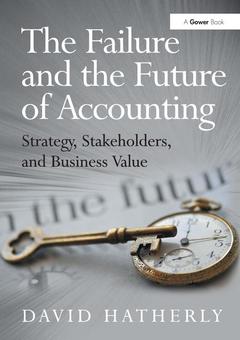Description
The Failure and the Future of Accounting
Strategy, Stakeholders, and Business Value
Author: Hatherly David
Language: English
Subjects for The Failure and the Future of Accounting:
Keywords
stakeholder; propositions; opportunity; cash; network; residual; income; balance; sheet; precautionary; 4S Accounting; NVP; Vice Versa; Accounting Based Performance Measures; Stakeholder Propositions; Working Capital; Precautionary Cash; Opportunity Cash; Comprehensive Income; Traditional Assets; LEADERS Business Model; Accounting Profit; Stakeholder Network; Sustainable Profit; Customer Proposition; Corporate Development; Residual Income; Cumulative Depreciation; Defined Benefit Pension; Legacy Promises; Closing Balance; Cash Statement; Spot Price; Incurred Loss Model; Expected Loss Model
Approximative price 177.01 €
In Print (Delivery period: 14 days).
Add to cartSupport: Print on demand
Description
/li>Contents
/li>Biography
/li>




